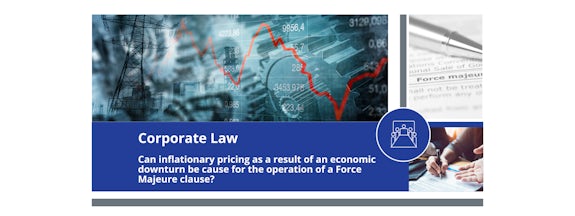
April 15, 2025

Before the Covid-19 pandemic, many business owners and operators had not paid much attention to the Force Majeure clauses they had (or in some cases, did not have) somewhere near the bottom of their commercial contracts. A boilerplate clause of no real significance, they thought.
However, as commerce ground to a halt, companies scrambled for ways out of contractual obligations to preserve cash balances. Enter Force Majeure. For those who don’t know, a Force Majeure clause in a commercial contract is a clause that excuses one or both parties from performance of the contract in some way following the occurrence of certain acts, events or circumstances beyond the control of the parties (known as Force Majeure Events). The exact operation of a Force Majeure clause will depend on the content of the clause. Quite often, a drafter will include a sweep-up phrase when referencing events that will constitute a Force Majeure Event in the form of “any other cause beyond the Seller’s reasonable control”.
On 23 September 2022 then-chancellor Kwasi Kwarteng, announced the now infamous mini-budget. The result was economic chaos. The pound fell to an all-time low against the US dollar and inflation rose to the highest rate in decades. With the rise of inflation, comes the rise of the cost of goods.. This begs the question:
Can inflationary pricing constitute a Force Majeure Event?
As a direct result of the mini-budget, cost of sales rose massively. Take the following hypothetical scenario. Worldwide Widgets Limited have a contract with Toys Aint Us Limited to supply stores worldwide with widgets at a price of £8 per unit. As a result of the mini-budget, Worldwide Widgets Limited cost per widget is now £10. In order to fulfill their obligations under the contract, they would have to run at an operating loss for the duration of the contract. This would put a massive hole in the balance sheet of Worldwide Widgets Limited. They may not survive.
Clearly, it is outwith the reasonable control of Worldwide Widgets Limited that the former Chancellor announced a suite of policies that sent the economic markets into meltdown and caused their cost of sales to rise massively. But how the courts would view an argument that inflationary pricing constitutes a Force Majeure Event is a largely untested argument. The answer lies in the construction of the clause.
In order to protect your business, it is best practice to ensure that the Force Majeure clauses in any commercial contracts to which you are a party are as clearly drafted as possible. To that end, the corporate team at Gilson Gray are vastly experienced in this area of law and would be delighted to assist.